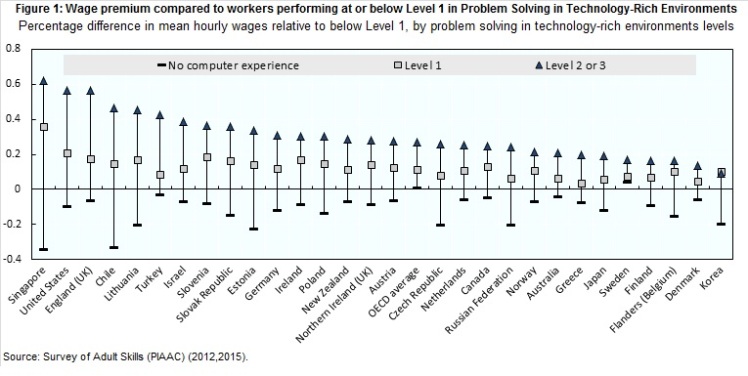 Information and communication technologies (ICT) are changing profoundly the skill profile of jobs. The use of ICT in the workplace ‘“ affecting only a handful of jobs a few decades ago ‘“ is now required in all but two occupations in the United States: dishwashing and food cooking (Berger and Frey, 2017). In most OECD countries, over 95% of workers in large businesses and 85% in medium-sized businesses have access to and use the Internet as part of their jobs. In small businesses the share is at least 65% (OECD, 2013).
Information and communication technologies (ICT) are changing profoundly the skill profile of jobs. The use of ICT in the workplace ‘“ affecting only a handful of jobs a few decades ago ‘“ is now required in all but two occupations in the United States: dishwashing and food cooking (Berger and Frey, 2017). In most OECD countries, over 95% of workers in large businesses and 85% in medium-sized businesses have access to and use the Internet as part of their jobs. In small businesses the share is at least 65% (OECD, 2013).
To seize the benefits of technological change, economies need ICT specialists: workers who can code, develop applications, manage networks and manage and analyse Big Data, among other skills. These skills enable innovation in a digital economy to flourish, but also support the infrastructure that firms, governments, commerce and users rely on (OECD, 2016a). However, besides these experts, all workers are increasingly required to have a minimum level of ICT skills, even those in low-skilled jobs. For instance, this is the case for blue-collar workers in factories that are entirely automated or waiters having to take orders on iPads.
In addition, workers will need a broader set of skills, complementary to ICT, to thrive in the digital economy. While working with the new technologies, workers will have to be able to take on complex, less automatable, tasks such as problem solving in novel situations. This requires solid literacy, numeracy and problem-solving skills, but also autonomy, co-ordination and collaborative skills which complement ICT skills (Grundke et al.,2017). Workers will also need to be capable of adapting continuously as technologies evolve.
The importance of digital skills is reflected in the wage returns to these skills (see Figure 1). Relative to workers who can only perform the most basic computer functions like typing or operating a mouse (workers at or below Level 1), workers able to solve relatively complex problems using a computer (Level 2/3) are paid 27% more, on average. These gaps are greater than 50% in England (UK), Singapore and the United States. In addition, as technology increasingly allows for a wider range of tasks to be automated, the value of skills needed for non-automatable tasks, such as social skills, is also likely to increase.

Against this background, it is worrying to see that 56% of the adult population in the OECD countries covered by PIAAC have no ICT skills or have only the skills necessary to solve the simplest problems in a technology-rich environment. Young people are much better at working in ICT-rich environments than older generations but even among 25-34 year olds a sizeable share is unprepared for the digital transformation of workplaces.
A new OECD policy brief on Skills for a Digital World calls for governments to take action to help ensure that an increasingly digital world yields better quality jobs and that both employers and workers have the means to take advantage of the new job opportunities that open up. Action is needed to: strengthen initial learning; anticipate and respond better to changing skill needs; improve incentives for further learning; and reinforce active labour market programmes for the unemployed. It will also be crucial to tackle skills mismatch and ensure that employers fully use the skills of their workers through management practices that motivate workers and through flexible work organisation which allows job content to be adapted or for workers to move to better suited jobs. This would enhance productivity and has the potential for reducing inequality (Adalet McGowan and Andrews, 2015; OECD, 2016b).
References
Adalet McGowan, M. and D. Andrews (2015), “Labour Market Mismatch and Labour Productivity: Evidence from PIAAC Data’, OECD Economics Department Working Papers, No. 1209, OECD Publishing, Paris, http://dx.doi.org/10.1787/5js1pzx1r2kb-en.
Berger, T. and C. Frey (2017), “Structural Transformation in the OECD: Digitalization, Deindustrialization and the Future of Work’, OECD Social, Employment and Migration Working Papers, forthcoming, OECD Publishing, Paris.
Grundke, R., M. Squicciarini, S. Jamet and M. Kalamova (2017), “Having the right mix: the role of skill bundles for comparative advantage and industry performance in GVCs’, OECD Science, Technology and Industry Working Papers, OECD Publishing, Paris. http://dx.doi.org/10.1787/518151965.
OECD (2016a), “Skills for a Digital World: 2016 Ministerial Meeting on the Digital Economy Background Report’, OECD Digital Economy Papers, No. 250, OECD Publishing, Paris. http://dx.doi.org/10.1787/5jlwz83z3wnw-en
OECD (2016b), OECD Employment Outlook 2016, OECD Publishing, Paris. http://dx.doi.org/10.1787/empl_outlook-2016-en.
OECD (2013), OECD Skills Outlook 2013: First Results from the Survey of Adult Skills, OECD Publishing, Paris. http://dx.doi.org/10.1787/9789264204256-en.
Access the original article from Glenda Quintini and the OECD policy brief on ‘Skills for a Digital World’ here.





 Watch:
Watch: